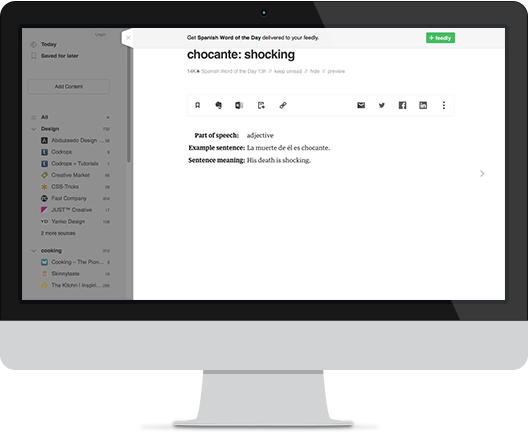In terms of vocabulary development, we were all little geniuses in childhood, learning hundreds of new words every year. By the time we entered first grade, most of us had active vocabularies of several thousand words.
Unfortunately, we weren’t geniuses for very long. By age 11 or 12, equipped with a sizable survival vocabulary, most of us lost some of our early enthusiasm for language, and the rate at which we picked up new words began to decline significantly. As adults, if we don’t make deliberate efforts to increase our vocabularies, we’re lucky to pick up even 50 or 60 new words a year.
The English language has so much to offer (between 500,000 and 1 million words, by most accounts) that it would be a shame to let our vocabulary-building talents go to waste. So here’s one way that we can regain some of our youthful brilliance: learn a new word each day.
Whether you’re a student preparing for the SAT, ACT, or GRE, or simply an unabashed logophile (or lover of words), starting each day with a fresh word can be intellectually nourishing—and more enjoyable than a bowl of All-Bran.
Here are three of our favorite daily word sites: all are free and available through e-mail subscriptions.
A.Word.A.Day (AWAD)
Founded in 1994, A.Word.A.Day at Wordsmith.org is the creation of Anu Garg, an India-born computer engineer who clearly enjoys sharing his pleasure in words. Simply designed, this popular site (nearly 400,000 subscribers from 170 countries) offers concise definitions and examples of words that relate to a different theme every week. The New York Times has called this «the most welcomed, most enduring piece of daily mass e-mail in cyberspace.» Recommended for all word lovers.
Oxford English Dictionary Word of the Day
For many of us, the Oxford English Dictionary is the ultimate reference work, and the OED Word of the Day provides a complete entry (including a wealth of illustrative sentences) from the 20-volume dictionary. You can sign up to have the OED’s Word of the Day delivered by e-mail or RSS web feed. Recommended for scholars, English majors, and logophiles.
Merriam-Webster’s Word of the Day
Less expansive than the OED site, the daily word page hosted by this U.S. dictionary-maker offers an audio pronunciation guide along with basic definitions and etymologies. The Merriam-Webster Word of the Day is also available as a podcast, which you can listen to on your computer or MP3 player. Recommended for high school and college students as well as advanced ESL students.
Other Daily Word Sites
These sites should also be useful to high school and college students.
- Dictionary.com Word of the Day
- The Learning Network (The New York Times)
- The Quotations Page Word of the Day
Of course, you don’t have to go online to learn new words. You can simply begin making a list of new words that you encounter in your reading and conversations. Then look up each word in a dictionary and write down the definition along with a sentence that illustrates how the word is used.
But if you need a little encouragement to work on building your vocabulary every day, sign up for one of our favorite word-a-day sites.
Not to be confused with «climb», a clime is a region known for its weather. In the dead of winter, we dream about heading to sunny climes, where we can hang out in shorts.
The key to remembering clime is that it’s so similar to «climate,» with which it shares the Greek root klima, «zone.» So a clime is a zone that has a characteristic climate. Folks in colder climes think nothing of the kind of snowfall that we down here in the south get all panicked about. But then again, when they come here to our warmer clime, they forget to put on sunscreen; people from one clime can learn a lot from a visit to a different clime.
Want to expand your vocabulary?
Get Word of the Day delivered straight to your inbox!
Sign up now (it’s free!)
Whether you’re a teacher or a learner, Vocabulary.com can put you or your class on the path to systematic vocabulary improvement.
Get started
Finally, a dictionary with a soul

Our definitions were written by humans, for humans.
Each word has a friendly explanation that makes it easy to remember.
Real world examples

Discover thousands of example sentences from current newspapers,
magazines, and literature.
World’s smartest, fastest dictionary

Find the word you’re looking for faster than any other online dictionary.
That’s less time searching, more time learning.
How can I learn new words daily?
- RSS
Get it in your inbox.
Fill out your email address to get Word of the Day in your email every day. Each language you sign up for will appear in your daily email.

Subscribe to Word of the Day
Join our Facebook community.
Get Word of the Day in your Facebook feed, along with blog updates, language-related news, and more. Our communities invite both experts and learners to join in discussion.
Choose your language:
Afrikaans,
Arabic,
Chinese,
Danish,
Dari,
Dutch,
English,
Esperanto,
French,
German,
Greek,
Haitian Creole,
Hebrew,
Hindi,
Icelandic,
Inglês,
Irish,
Italian,
Japanese,
Korean,
Latin,
Norwegian,
Pashto,
Polish,
Brazilian Portuguese,
Russian,
Spanish,
Swedish,
Thai,
Turkish,
Urdu,
Zulu


Follow a language on Twitter.
Receive daily tweets of the Word of the Day. Follow any language of your choice and it will arrive in your Twitter stream.
Choose your language:
Afrikaans,
Arabic,
Chinese,
Danish,
Dari,
Dutch,
English,
Esperanto,
Farsi,
French,
German,
Greek,
Hebrew,
Hindi,
Icelandic,
Inglês,
Irish,
Italian,
Japanese,
Korean,
Latin,
Norwegian,
Pashto,
Polish,
Brazilian Portuguese,
Russian,
Spanish,
Swedish,
Thai,
Urdu,
Zulu
Subscribe to RSS.
Choose from any of the languages in the dropdown above and click the RSS link. (What’s RSS?)
Choose your language:
Arabic,
Chinese,
Dari,
Dutch,
English for Portuguese Speakers,
English for Spanish Speakers,
Esperanto,
French,
German,
Hebrew,
Hindi,
Indonesian,
Irish,
Italian,
Japanese,
Korean,
Latin,
Norwegian,
Pashto,
Polish,
Portuguese,
Russian,
Spanish,
Swedish,
Turkish,
Urdu


1. A.Word.A.Day (AWAD)
You can see the word of the day, and yesterday’s word of the day, on the website or through an email subscription. The website is strikingly simple, but highly useful. It provides the pronunciation, meaning, etymology, and usage of the selected word. Below the entry, the owner, Anu Garg, also presents a thought of the day. The New York Times commented that this website is “The most welcomed, most enduring piece of daily mass e-mail in cyberspace.” In fact, it has over a million subscribers from over 170 countries.
2. Merriam-Webster’s Word of the Day
One of the most respected dictionaries in the world, Merriam-Webster has a sophisticated layout for its word-of-the-day page. It provides a definition (with sound of the word spoken included), a “Did you know” section, examples of its usage, a “Name that synonym” section, podcasts, and a word of the day calendar at the bottom. Those who are truly interested in words and their histories, this dictionary will be a treat. Its “Did you know” section is expansive, and allows readers to understand the nuances of each selected word. On the left of the presentation is an easy way to share the word of the day through Facebook, Twitter, and Google Plus. You can even get the word of the day emailed to you through a subscription. It even has a section for learners called a learner’s dictionary. This dictionary also has a word-of-the-day category.
3. Wordnik
This website is all about words, with a word community, word of the day, and random word pages. On its word-of-the-day page, it has concise definitions of words with ample example sentences with the chosen word being used, extra notes on nuances, and also stats on its usage and even its Scrabble score. The fantastic thing about this page is that each word is accompanied with real examples from literature, not just sentences made up on the spot that sound unnatural. So, not only will you learn a new word each day, but also become knowledgeable in literature through this website. It also has an easy-to-access archive, and a convenient way of sharing words via social media.
4. Duolingo
This is perhaps the best language learning app and website out there. In turn, it is a great tool for learning new words. You can compete with your friends and family through the app, so you can gain that motivation needed to learn new words. It has a simple but pleasant layout, with many different exercises for learning: speaking, listening, writing, multiple choice questions, matching word exercises, and more. You can either strengthen what you already know, or venture into the world of new words each day. Duolingo focuses on obtaining a streak, so you know how many days in a row you have been learning a certain language (in our case, it is most likely English). There are many other language learning apps on the market, but it seems Duolingo takes the cake in terms of efficiency, user-friendliness, and motivation. It even has a cute owl mascot that cheers you on as you go through the exercises. I think that most people use the app rather than the website; however, both can be useful. It is important to download the necessary keyboards for the languages you are learning, though.
5. Dictionary.com’s Word of the Day
This is another popular option for learning new words easily. It shows the definitions in the form of a meme or picture you can conveniently share on social media (including showing the pronunciation and what kind of word it is). Below the definitions are citations of the word of the day’s usage from literature. Lastly, there is a section that discusses the origin of the word. You can sign up for an email subscription to the page, and seeing the visual archive of the word of the day for the previous day is just a scroll away.
6. Oxford Dictionary’s Word of the Day
Maybe the most trusted dictionary in the world, the Oxford Dictionary website also has a webpage that features a word of the day. For each entry, you have an audio pronunciation guide, a definition, the word’s origin, and an easy-to-share picture of the word with a pronunciation guide across social media. I like that the Oxford Dictionary focuses on archaic usages of words as well, as for wordaholics, these archaic definitions can be useful to know and interesting to understand. Like most sites of this nature, it also has an email subscription option. Another section of this website to check out if you have time is “Explore the English Language,” which has wordlists and word origin features.
7. New York Times’ Word of the Day
A standard in the news industry, it is also a fantastic tool for learning. The New York Times presents a word of the day daily, attached with a quiz. What is also useful is that it shows words in context of The New York Times itself. So, they will show how the word was used in news articles from the Times. Each entry has sections for definitions, examples of its usage in news articles, and a quiz at the bottom. After you finish the quiz, you will see a more detailed look into the chosen word, discussing its nuances. A great tool for learning more words, and more about them.
8. WordReference.com’s Word of the Day
The special thing about this website is that it offers two categories: basic word of the day, and intermediate word of the day. The basic word of the day is aimed at beginners and the intermediate word of the day is focused on people who have been learning English for some time. Though each category has entries that are filled with detail, there is a clear difference between basic and intermediate entries. In the basic section, entries have sections dedicated definitions, common uses, usage within pop culture, and a button that reads “see full definition,” which leads a user to an elaborated entry. For the intermediate entries, there are sections devoted to expanded definitions, example sentences, words most often used with the chosen entry, usage within pop culture, “did you know,” origins, and once again a “see full definition” button. This seems like the most comprehensive website for learning words and their background stories, so to say. You can get these definitions sent to you by email, and can also share them easily via Facebook and Twitter. You can scroll through entries as if you were on a common blogging site.
9. Vocabulary.com
This website tries its best to make learning new words enjoyable. It has word games to play, you can look up words, and it has word lists. They say if you start playing with language, you will learn it quickly. This website seems to take this approach. When learning is fun and flexible, words will be retained at a better rate. A great thing about its quizzes is that when you answer a question, it will describe the word in detail. The search option has examples sentences written by humans, not computers (it happens often it seems), examples sentences that are in touch with the real world of how English is being used, and claims to be the fastest-working dictionary. Its layout is user-friendly and intuitive. In the lists section, there are myriad lists focused on different subjects, ranging from baseball to movies. It is a highly enjoyable and engaging website for learning new words, and for studying English in general.
10. Word of the Day! App
For people who are crazy about checking other dictionaries for varying definitions, this is the app for them. This app features the following sources:
- Merriam-Webster
- Dictionary.com
- Oxford English Dictionary
- The Free Dictionary
- The Learning Network
- WordSpy
- Latin Word of the Day
- MedTerms
- Yahoo! Education
You can conveniently compare definitions, and discover the nuances of words you want to delve into. In addition, you can “star” and “favorite” certain definitions and words. These starred and favorited words can be shared with friends, and the app will also alert you when new words have been entered into its system. It’s a free app, so it is a catch for those who don’t want to spend to learn. The entries for the words have audio recordings of pronunciation, root meanings, examples sentences, and connotations of chosen words.
The word of the day[edit]
Why create a word of the day mailing-list[edit]
We need in some way to promote wiktionary — so the easiest way is through mailings … and another easy way is: to send the word of the day to a list of people interested in receiving the word of the day inserting obviously the link to the word.
The list can be used for further announcements in the footer, of course.
Available languages[edit]
Italian[edit]
To subscribe to the Italian word of the day, please send a clean message to:
laparoladelgiorno-subscribe@yahoogroups.com or visit
groups.yahoo.com/group/laparoladelgiorno
Per iscriverti per la ricezione della parola del giorno in italiano, invia un messaggio vuoto a:
laparoladelgiorno-subscribe@yahoogroups.com
English[edit]
The English Wiktionary has a word of the day feature — Wiktionary:Wiktionary:Word of the day.
Any language[edit]
OmegaWiki has it’s word of the day on it’s main page .. every day one DefinedMeaning is chosen to get extra attention. Often it is a word that had some relevance on the previous day.
News[edit]
I invited 50 people to the Italian Word of the day — now we are 19 members in the group. This result was achieved in only 2 days and I feel it is indeed a quite interesting result. This means that this concept can work for any language — and there can be similar projects to the Word of the day that work as well. To my opinion this opens the door to many possibilities. —Sabine 21:21, 6 Mar 2005 (UTC)
Go to funny
r/funny
r/funny
Welcome to r/Funny, Reddit’s largest humour depository.
Members
Online
by
seattlesarah420
Word of the day email. Who’s the first person who popped into your mind?


Archived post. New comments cannot be posted and votes cannot be cast.
A word that is well described on the home page of urban dictionary The word is usually something that people need to know to survive the urban world for at least a day. This word is something vital to your survival, so everybody who can, should really read this word every day of their lives.
Bobby: I read the UWOTD… it really helped me out
Tom: It obviously does man, I mean it’s THE URBAN WORD OF THE DAY
Bobby: Yeah, I heard it was vital to your survival
Tom: It is, man. It is.
Get the Urban Word Of The Day mug.
adjective
lak-uh-DAY-zih-kul
What It Means
Something or someone described as lackadaisical is lacking in life, spirit, or zest.
// His teachers did not approve of his lackadaisical approach to homework.
See the entry >
lackadaisical in Context
«A song like the lackadaisical ‘Funny in Dreams’ could scan as too facile—who’d have thought that strange things happen in our dreams!—but she [folk singer, Nicole Rodriguez] deftly uses it as an opportunity for vivid introspection.» — Rachel Saywitz, Pitchfork, 10 Feb. 2023
Which Came First?
-
- hot take or cold shoulder?
You know what it looks like… but what is it called?
TAKE THE QUIZ
Can you make 12 words with 7 letters?
PLAY
Did You Know?
We’re too enthusiastic about the lexicon to be lackadaisical about words, but lackadaisical itself is rooted in the sort of sorrow that can put a damper on one’s passion for vocabulary expansion. When folks living from the late 17th to the late 19th century had one of those days when nothing goes right, they could cry «Lackaday!» to express their sorrow and disappointment as a shortened form of the expression «alack the day.» (Alack is an interjection used to express sorrow or regret.) By the mid-1700s, the adjective lackadaisical had been formed to describe these miserable ones and their doings and sayings. Around the same time, the word lackadaisy was introduced to the language as an interjection similar to lackaday; it was never as prevalent as lackaday, but it may have influenced the development of lackadaisical.
Name That Antonym
Fill in the blanks to complete an antonym of lackadaisical: e _ t _ r _ r _ s _ n _.
VIEW THE ANSWER
Podcast
Subscribe to America’s largest dictionary and get thousands more definitions and advanced search—ad free!
Merriam-Webster unabridged



